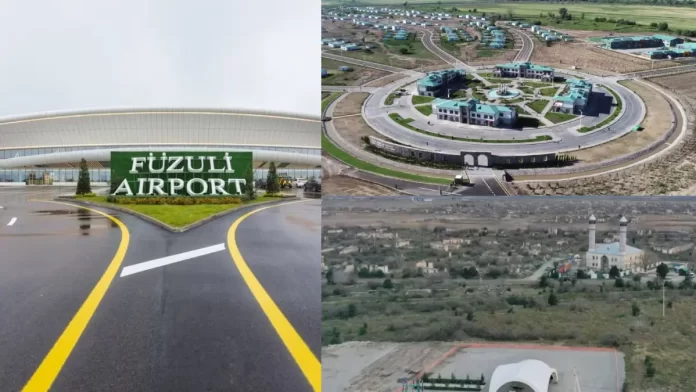A year after the grand opening, Fuzuli International Airport in Azerbaijan, inaugurated with much fanfare by Presidents Ilham Aliyev and Recep Tayyip Erdogan, stands eerily vacant. Reports reveal a mere one arrival per week to the $44 million facility in 2023, and current data for 2024 indicates zero flight activity.
This isolated airport is just one of many ambitious projects undertaken in territories reclaimed from ethnic Armenians after the Second Karabakh War in 2020. The extensive construction drive includes sleek airports near Zangilan and ongoing work on a third facility in the mountains near Lachin.
Azerbaijan portrays these endeavors as a triumphant “return to liberated territories” for the hundreds of thousands displaced during the 1988-94 war over Nagorno-Karabakh. However, skepticism arises as the scale of projects in isolated regions raises questions about their practicality.
Azerbaijani economist Toghrul Valiyev suggests that various government agencies might be competing for funding, leading to “creative” ideas for spending. The allocation of $3.1 billion in 2023 for reconstruction in recaptured areas further intensifies scrutiny.
Issues extend beyond vacant airports, with concerns about the construction of a “smart village” by the Ministry of Agriculture and the recommendation of a new airport in Zangilan by Azerbaijan Airlines, despite existing airports nearby in Armenia.
The return of ethnic Armenians to Nagorno-Karabakh has been slow, with only around 2,000 Azerbaijanis reported to have returned by October 2023. Baku aims to resettle 150,000 people by 2027, but international legal experts view the forced exodus of ethnic Armenians during the conflict as a potential war crime.
Armenian-American researcher Simon Maghakyan raises suspicions that the construction projects may be a cover for the erasure of Armenian historical sites. Satellite monitoring and international pressure remain crucial for the preservation of remaining cultural heritage in the region. The 2021 provisional ruling by the International Court of Justice (ICJ) emphasized the need for Azerbaijan to “punish and prevent” the destruction of Armenian monuments.
As Azerbaijan’s construction drive continues, the international community watches closely, hoping that cultural heritage and the rights of displaced populations will be respected in the process.



